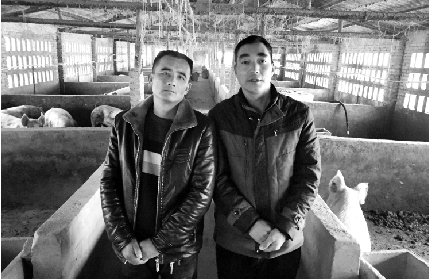The monthly salary of going out to work is 1000 yuan, and now he returns to his hometown to raise pigs and start a business with an annual income of 150000 yuan.

Ma Xiaofei (right) takes a photo with his brother Ma Pengxiao in the pigsty.
2016 was a bumper year for Ma Xiaofei, a villager from Jin Liu Village, Kuzhuang Xiang, Xiangcheng County, Xuchang City, Henan Province. Last year, Ma Xiaofei earned nearly 150000 yuan from selling pigs and built a three-story building in the village. Ma Xiaofei, 41, lamented: "I used to earn 1200 yuan a month to work in Zhongshan, Guangdong, but now when I go back to my hometown to raise pigs, I can not only look after my elderly parents, but also have a way to get rich."
Returning to hometown to raise pigs earns nearly 150000 a year.
On the third day of the Lunar New year, Ma Xiaofei, his brother Ma Pengxiao and his sister both spent the Spring Festival at their parents' house. Walking into Jin Liu Village, a row of blue steel tile houses is very eye-catching. This is their cattle and sheep farm, in which there are more than a dozen beef cattle and dozens of meat sheep. Ma Xiaofei's father told the Yangtze River Business Daily that although the scale of the farm is small, it is all organic farming. After the treatment of cow and sheep manure, it is put into the farmland to raise vegetables, and the feed for raising cattle is also organic feed. However, Ma Xiaofei's father admitted that the market was not very good last year and did not make any money.
Market fluctuations have a greater impact on farmers, and Ma Xiaofei's pig farm made a good profit in 2016 compared with 2015. Ma Xiaofei told Changjiang Business Daily that after several years of breeding, there are now 40 sows and more than 300 piglets, which are sold in batches according to the needs of different levels. last year, the net profit was 140000 to 150000 yuan.
Ma Xiaofei's pigsty is dozens of meters away from his father's farm. At a glance, four bungalows have an area of more than 1000 square meters. Walking on the dirt road in the countryside, under the leadership of Ma Xiaofei, a reporter from the Yangtze River Business Daily walked into the pigsty. Ma Xiaofei said that pigs are most afraid of getting sick. Under normal circumstances, they have to change their overalls and enter the pigsty again. Walking into the pigsty, a heat wave hit, he said: "it is winter, pigs are afraid of the cold, so the pigsty is more tightly covered." Now, although all the materials are fed automatically, it is not so laborious, but the prevention and control of the epidemic should not be careless. " Ma Xiaofei said: in particular, pig breeding should improve livestock hygiene and be particularly careful in the management of breeds and feed.
Farmers expect the government to guide ecological development.
A reporter from the Yangtze River Business Daily visited a village near Kuzhuang Township, and some villagers told the reporter that one or two nearby pig farms had been closed. Many villagers say that pig manure seriously pollutes the ditches in the village, and some of the ditches used to be turned into garbage dumps.
Ma Xiaofei is also worried about this. He said frankly that environmental protection must be a major event, and he, as a farmer, must also support it. To this end, he plans to plant fruit trees near the pigsty this year to improve the environment around the pigsty. During the visit, many farmers expressed the hope that the government will guide them, arrange for the guidance of enterprise experts, and make proper use of pig manure, which can also become a very good resource, which may play a very good role in soil improvement, and the cultivation of organic crops can also be guaranteed. A villager returning to Kuzhuang Township suggested that pig farming should carry out the combination of planting and breeding, ecological agriculture, circular economy and other ways to turn feces into treasures, which can not only control pollution on the one hand, but also generate income for farmers on the other.
Before leaving, Ma Xiaofei told the Yangtze River Business Daily: "We will certainly carry out sewage treatment in accordance with national standards and requirements, do a good job in breeding, and find a balance between ecological protection and industrial prosperity."
Related
- A course of planting techniques and methods on how to grow carrots
- How to plant the latest tulips?
- Is it better to pick tea in the morning or in the afternoon? When is the best time for tea to be picked? what is the third or fifth tea?
- Launch Yuanxiao Happy combination Haocha + Tea Yuan healthy Taste
- Penghu Tourism "Fireworks 20 Parade with You"
- 2022 West Lake Happiness holds "Digital Revitalization Voucher" and draws iphone13 and laptop.
- Banqiao Fuzhou social houses are designed to change start-up combined with police elimination to create a safe and livable environment
- The convenient measure of "mechanical weeding" in Xinbei has been abused and the Agriculture Bureau has imposed heavy penalties on the illegal land consolidation.
- Changgeng University Joins Hands with Four Memory Factories to Rescue Memory Talent Shortage
- The list of Taiwan's top 100 MVP managers is listed by the Director-General of the Farmers' Association of Sanxia District.


